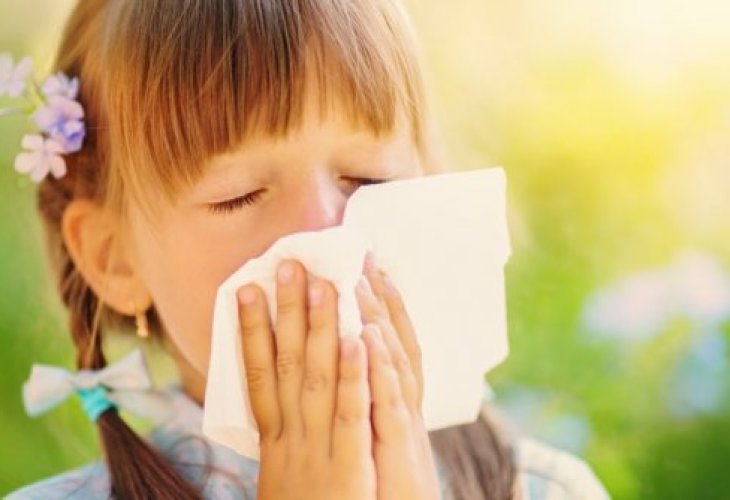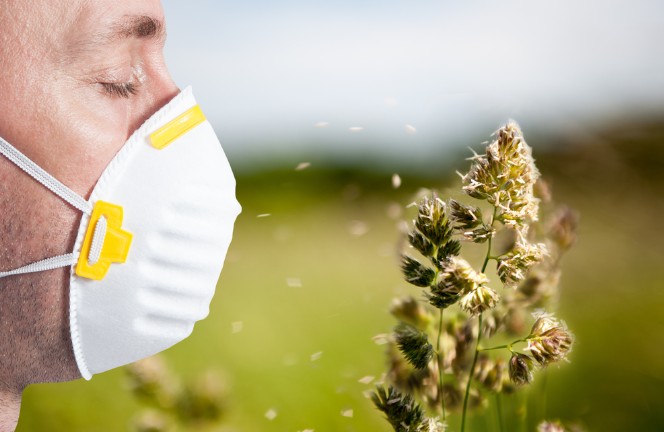How to Treat Spring Allergies
Spring brings renewal and blossoming, but for some, the news isn't so bright as it also brings allergies.

Allergies are a health nuisance for one in five Israelis. The beautiful bloom turns into a kind of nightmare involving a runny nose, frequent sneezing, and irritation of the mucous membranes. Although it seems there is no way to cope with these phenomena, it is possible to treat allergies without the constant need for preventive medications.
"Allergy is defined as an exaggerated reaction of our immune system against foreign substances, but which are not defined as disease-causing," explains homeopath Liat Greenwald-Daloyah, a member of the Israeli Association of Classical Homeopathy. "The immune system behaves towards the foreign agent (allergen) as if it were invaders, like viruses or bacteria. This creates an inflammatory response that, among other things, leads to the release of histamines - chemicals responsible for many allergy symptoms such as runny nose and watery eyes, breathing difficulties, nausea, sinusitis, diarrhea, vomiting, rashes, and more..
Not everyone experiences the same allergy symptoms, and for some, only one symptom will be dominant. Sometimes it is even difficult to distinguish between seasonal allergies and a cold.
Seasonal allergies affect about 20% of the population, primarily occurring from February to October, and are caused by allergens spread in the air from the beautiful blooms of flowers and shrubs around us, from grass plants and various trees such as cypress, olive, and pecan, over large areas.
Another factor occurring during this period is humidity which awakens dust mites - microscopic annoying creatures resembling ticks. The mites feed on our shedding skin flakes and their excretions, carried in the air and clinging to textiles (pillows, blankets, sheets, etc.) may cause allergies.
![(Illustrative photo: shutterstock)]() (Illustrative photo: shutterstock)
(Illustrative photo: shutterstock)
So what should you do?
"There are three main ways to deal with spring allergies," says Greenwald-Daloyah. "The first way is diagnosis - allergy diagnosis is based on medical history, patient examination using skin tests (prick test, patch test) conducted on the patient's back or forearms, and special blood tests that check for the presence of allergy antibodies in the blood. Special attention is given to the timing of the development of allergic symptoms and their relation to different environmental factors. The number of tests is limited to several dozens, and in principle, it is not possible to diagnose all types of substances causing allergies..
"The second way is prevention - as the name suggests, it is to try to avoid contact with allergens. Avoid going to areas of blooms, and more importantly, avoid staying near pine, olive, and pecan trees or plants known to cause sensitivity. Although it is almost impossible to completely avoid exposure to allergens, there are several ways to minimize the damage. An effective way to mitigate harm, for instance, is to travel with car windows closed, maintain closed windows at home, and stay away from factors known to trigger your seasonal allergies as much as possible. Using air conditioning systems with appropriate filters can also greatly reduce the entry of allergens from outside into the home. As for dust mites, ensure the home's cleanliness from dust more frequently and wash textiles at high temperatures..
"Treatment - seasonal allergies can be treated with medications (antihistamines and steroids) provided in various forms like local sprays, eye drops, inhalers, pills, etc. Some consider immunological vaccines to eliminate the allergy if the allergen type causing the allergy is known..
Homeopathic Treatment of Allergy Symptoms
Homeopathic treatment is based on using substances that can cause healthy people allergy-like symptoms. In this way, homeopathy encourages the body's natural healing powers to cure the allergic tendency in the long term and not just suppress the symptoms of a single attack. For example, when peeling an onion, the eyes begin to sting, tear, and the nose starts to drip. These symptoms, familiar to all of us, match the 'disease picture' of the homeopathic preparation made from the onion itself. Thus, a person suffering from hay fever and presenting symptoms that match the picture created by the onion will receive the homeopathic preparation of the onion, and their condition will improve quickly.
The homeopathic preparation is tailored based on the combination of reasons that caused the appearance of the phenomenon and according to the unique manner it manifests in each case. The homeopathic treatment is customized for each patient based on their symptoms, personality, medical history, sensitivity, and unique characteristics as presented during the interview conducted by the homeopathic practitioner.
Usually, the homeopathic medicine will be given alongside the conventional medication provided to the allergy sufferer. As the immune system strengthens, it may be possible to gradually reduce the amount of medicine given to the person until complete cessation.
Homeopathic treatment provided by certified homeopaths can offer fast, effective, and side-effect-free solutions suitable for all ages for allergy sufferers.
In classical homeopathy, successful allergy treatment is considered to be when the attacks reduce until their complete disappearance. Indeed, studies show significant improvement (about 80%) in the outbreak of allergic phenomena and the severity of symptoms among most allergy sufferers treated with homeopathy.
"Allergy is defined as an exaggerated reaction of our immune system against foreign substances, but which are not defined as disease-causing," explains homeopath Liat Greenwald-Daloyah, a member of the Israeli Association of Classical Homeopathy. "The immune system behaves towards the foreign agent (allergen) as if it were invaders, like viruses or bacteria. This creates an inflammatory response that, among other things, leads to the release of histamines - chemicals responsible for many allergy symptoms such as runny nose and watery eyes, breathing difficulties, nausea, sinusitis, diarrhea, vomiting, rashes, and more..
Not everyone experiences the same allergy symptoms, and for some, only one symptom will be dominant. Sometimes it is even difficult to distinguish between seasonal allergies and a cold.
Seasonal allergies affect about 20% of the population, primarily occurring from February to October, and are caused by allergens spread in the air from the beautiful blooms of flowers and shrubs around us, from grass plants and various trees such as cypress, olive, and pecan, over large areas.
Another factor occurring during this period is humidity which awakens dust mites - microscopic annoying creatures resembling ticks. The mites feed on our shedding skin flakes and their excretions, carried in the air and clinging to textiles (pillows, blankets, sheets, etc.) may cause allergies.
 (Illustrative photo: shutterstock)
(Illustrative photo: shutterstock)So what should you do?
"There are three main ways to deal with spring allergies," says Greenwald-Daloyah. "The first way is diagnosis - allergy diagnosis is based on medical history, patient examination using skin tests (prick test, patch test) conducted on the patient's back or forearms, and special blood tests that check for the presence of allergy antibodies in the blood. Special attention is given to the timing of the development of allergic symptoms and their relation to different environmental factors. The number of tests is limited to several dozens, and in principle, it is not possible to diagnose all types of substances causing allergies..
"The second way is prevention - as the name suggests, it is to try to avoid contact with allergens. Avoid going to areas of blooms, and more importantly, avoid staying near pine, olive, and pecan trees or plants known to cause sensitivity. Although it is almost impossible to completely avoid exposure to allergens, there are several ways to minimize the damage. An effective way to mitigate harm, for instance, is to travel with car windows closed, maintain closed windows at home, and stay away from factors known to trigger your seasonal allergies as much as possible. Using air conditioning systems with appropriate filters can also greatly reduce the entry of allergens from outside into the home. As for dust mites, ensure the home's cleanliness from dust more frequently and wash textiles at high temperatures..
"Treatment - seasonal allergies can be treated with medications (antihistamines and steroids) provided in various forms like local sprays, eye drops, inhalers, pills, etc. Some consider immunological vaccines to eliminate the allergy if the allergen type causing the allergy is known..
Homeopathic Treatment of Allergy Symptoms
Homeopathic treatment is based on using substances that can cause healthy people allergy-like symptoms. In this way, homeopathy encourages the body's natural healing powers to cure the allergic tendency in the long term and not just suppress the symptoms of a single attack. For example, when peeling an onion, the eyes begin to sting, tear, and the nose starts to drip. These symptoms, familiar to all of us, match the 'disease picture' of the homeopathic preparation made from the onion itself. Thus, a person suffering from hay fever and presenting symptoms that match the picture created by the onion will receive the homeopathic preparation of the onion, and their condition will improve quickly.
The homeopathic preparation is tailored based on the combination of reasons that caused the appearance of the phenomenon and according to the unique manner it manifests in each case. The homeopathic treatment is customized for each patient based on their symptoms, personality, medical history, sensitivity, and unique characteristics as presented during the interview conducted by the homeopathic practitioner.
Usually, the homeopathic medicine will be given alongside the conventional medication provided to the allergy sufferer. As the immune system strengthens, it may be possible to gradually reduce the amount of medicine given to the person until complete cessation.
Homeopathic treatment provided by certified homeopaths can offer fast, effective, and side-effect-free solutions suitable for all ages for allergy sufferers.
In classical homeopathy, successful allergy treatment is considered to be when the attacks reduce until their complete disappearance. Indeed, studies show significant improvement (about 80%) in the outbreak of allergic phenomena and the severity of symptoms among most allergy sufferers treated with homeopathy.

